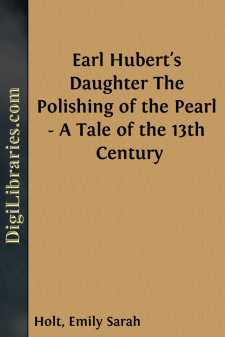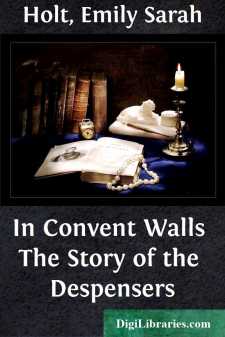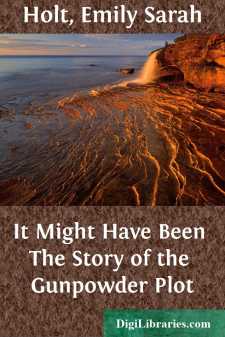Categories
- Antiques & Collectibles 13
- Architecture 36
- Art 48
- Bibles 22
- Biography & Autobiography 815
- Body, Mind & Spirit 144
- Business & Economics 28
- Children's Books 18
- Children's Fiction 14
- Computers 4
- Cooking 94
- Crafts & Hobbies 4
- Drama 346
- Education 58
- Family & Relationships 59
- Fiction 11835
- Games 19
- Gardening 17
- Health & Fitness 34
- History 1378
- House & Home 1
- Humor 147
- Juvenile Fiction 1873
- Juvenile Nonfiction 202
- Language Arts & Disciplines 89
- Law 16
- Literary Collections 686
- Literary Criticism 179
- Mathematics 13
- Medical 41
- Music 40
- Nature 180
- Non-Classifiable 1768
- Performing Arts 7
- Periodicals 1453
- Philosophy 65
- Photography 2
- Poetry 896
- Political Science 203
- Psychology 44
- Reference 154
- Religion 515
- Science 126
- Self-Help 85
- Social Science 83
- Sports & Recreation 34
- Study Aids 3
- Technology & Engineering 60
- Transportation 23
- Travel 463
- True Crime 29
Emily Sarah Holt
Emily Sarah Holt (1836-1893) was a prolific English novelist known for her historical fiction, particularly focusing on the Tudor period. Her works often blended romance with detailed historical accuracy, appealing to a wide audience fascinated by the Renaissance era. Holt's novels were noted for their strong female protagonists and vivid portrayal of English society during pivotal historical moments.
Author's Books:
Sort by:
by:
Emily Sarah Holt
Castles in the Air. “O pale, pale face, so sweet and meek, Oriana!” Tennyson. “Is the linen all put away, Clarice?” “Ay, Dame.” “And the rosemary not forgotten?” “I have laid it in the linen, Dame.” “And thy day’s task of spinning is done?” “All done, Dame.” “Good. Then fetch thy sewing and come hither, and I will tell thee somewhat touching the lady whom thou art to...
more...
by:
Emily Sarah Holt
Friends and neighbours. “Give you good-morrow, neighbour! Whither away with that great fardel (Bundle), prithee?” “Truly, Mistress, home to Staplehurst, and the fardel holdeth broadcloth for my lads’ new jerkins.” The speakers were two women, both on the younger side of middle age, who met on the road between Staplehurst and Cranbrook, the former coming towards Cranbrook and the latter from...
more...
by:
Emily Sarah Holt
Little Clare’s first home. “The mossy marbles restOn the lips he hath pressedIn their bloom,And the names he loved to hearHave been carved for many a yearOn the tomb.” Oliver Wendell Holmes. “Cold!” said the carrier, blowing on his fingers to keep them warm. “Cold, bully Penmore!” ejaculated Hal Dockett,—farrier, horse-leech, and cow-doctor in ordinary to the town of Bodmin and its...
more...
by:
Emily Sarah Holt
Preface. The thirteenth century was one of rapid and terrible incidents, tumultuous politics, and in religious matters of low and degrading superstition. Transubstantiation had just been formally adopted as a dogma of the Church, accompanied as it always is by sacramental confession, and quickly followed by the elevation of the host and the invention of the pix. Various Orders of monks were flocking...
more...
by:
Emily Sarah Holt
Preface. This is not a story which requires much preface. The tale speaks for itself. But it is only right to inform the reader, that the persons who play their parts in it (apart from the historical details given) are all fictitious, excepting John Laurence and Agnes Stone. It rests, under God, with the men and women of England—and chiefly with those of them who are young now—whether such events...
more...
by:
Emily Sarah Holt
Preface. The historical portion of this tale has been partially narrated in one of my previous volumes, “In All Time of our Tribulation,” in which the Despenser story is begun, and its end told from another point of view. That volume left Isabelle of France at the height of her ambition, in the place to reach which she had been plotting so long and so unscrupulously. Here we see the Nemesis come...
more...
by:
Emily Sarah Holt
Chapter One. The last Night in the Old Home. “Which speaks the truth - fair Hope or ghastly Fear? God knoweth, and not I.Only, o’er both, Love holds her torch aloft, And will, until I die.” “Fiddle-de-dee! Do give over snuffing and snivelling and sobbing, and tell me if you want your warm petticoat in the saddle-bag. You’d make a saint for...
more...
by:
Emily Sarah Holt
Chapter One. The Dwellers at Selwick Hall. “He would be on the mountain’s top, without the toil and travail of the climbing.”—Tupper. Selwick Hall, Lake Derwentwater, October ye first, Mdlxxix. It came about, as I have oft noted things to do, after a metely deal of talk, yet right suddenly in the end. Aunt Joyce, Milly, Edith, and I, were in the long gallery. We had been talking a while...
more...
by:
Emily Sarah Holt
A Regular of Oxenforde. “Give me the book, and let me read; My soul is strangely stirred—They are such words of love and truth As ne’er before I heard!” Mary Howitt. The sun was shining brightly on the battlements and casements of Lovell Tower. The season was spring, and the year 1395. Within the house, though it was barely seven o’clock in the...
more...
by:
Emily Sarah Holt
Preface. The story of the following pages is one of the least known yet saddest episodes in English history—the first persecution of Christians by Christians in this land. When Boniface went forth from England to evangelise Germany, he was received with welcome, and regarded as a saint: when Gerhardt came from Germany to restore the pure Gospel to England, he was cast out of the vineyard and slain....
more...











